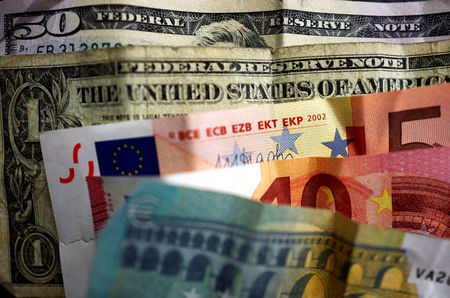
Investing.com – The U.S. dollar edged lower Monday, consolidating after climbing to a near eight-week high last week, while the euro rose despite weak German business sentiment.
At 05:25 ET (09:25 GMT), the Dollar Index, which tracks the greenback against a basket of six other currencies, traded 0.2% lower at 105.235, after touching a high of 105.91 last week.
Dollar looks to PCE data for guidance
The U.S. currency received a boost last week after the release of stronger-than-expected readings, with the resilient U.S. economy potentially creating more room for the Federal Reserve to keep interest rates elevated.
Traders have banked some of those gains at the start of the new week, as the focus turns towards the release of price index data.
Fed officials have called for more data showing a slowing of inflation before agreeing to cut interest rates, and this Friday’s reading of the Fed’s preferred inflation gauge is likely to factor into the outlook for interest rates.
Economists expect annual growth in the index to slow to 2.6% in May. A soft reading is likely to bolster bets on a rate cut as early as September, which futures currently price as a 65% prospect, according to the CME FedWatch tool.
Euro rebounds despite dip in Ifo reading
rose 0.2% to 1.0718, rebounding after recent losses despite German business morale unexpectedly falling in June.
The Ifo institute said its declined to 88.6 in June from 89.3 in May, compared with expectations of a reading of 89.7.
“The German economy is having difficulty overcoming stagnation,” said Ifo president Clemens Fuest.
The single currency has dropped over 1% this month after the right-wing performed well in the European Parliament elections earlier in June, resulting in French President Emmanuel Macron calling a snap election.
rose 0.1% to 1.2659, with sterling stabilizing after falling close to a five-week low in the wake of the Bank of England’s latest .
The BoE kept rates on hold, but some policy makers said the decision not to cut was “finely balanced”, raising expectations that policymakers will agree to a cut when they next meet at the start of August.
“Markets remain undecided on an August move (14bp priced in) and in our view, are also still too conservative on the total easing this year with 47bp versus our call for 75bp,” analysts at ING said, in a note.
“Our dovish BoE view means a bearish call on the pound this summer. We could also see some negative spillover on GBP from the UK election (4 July), where a Labour landslide win is largely expected – but perhaps a good result from the populist hard-Brexiteer Reform UK party may create some market jitters.”
Yen falls, drawing intervention talk
In Asia, traded 0.1% lower to 159.68, retreating after the pair rose as high as 159.94 in early trade Monday, its highest since April 29, when it reached a 34-year high of 160.245 leading to Japanese authorities spending roughly 9.8 trillion yen to support the currency.
The yen’s recent weakness drew warnings from several major Japanese officials over more intervention, with the country’s main currency diplomat Masato Kanda saying the government would “intervene 24 hours a day if necessary.”
edged higher at 7.2618, trading within a very narrow range with the yuan close to its lowest in seven months, hurt by worries about weakness in the world’s second-largest economy.










